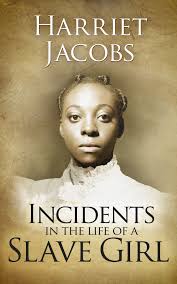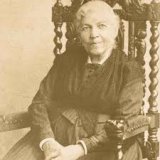Incidents in the Life of a Slave Girl Page #20
Incidents in the Life of a Slave Girl, written by herself is an autobiography by Harriet Jacobs, a mother and fugitive slave, published in 1861 by L. Maria Child, who edited the book for its author. Jacobs used the pseudonym Linda Brent.
As the months passed on, my boy improved in health. When he was a year old, they called him beautiful. The little vine was taking deep root in my existence, though its clinging fondness excited a mixture of love and pain. When I was most sorely oppressed I found a solace in his smiles. I loved to watch his infant slumbers; but always there was a dark cloud over my enjoyment. I could never forget that he was a slave. Sometimes I wished that he might die in infancy. God tried me. My darling became very ill. The bright eyes grew dull, and the little feet and hands were so icy cold that I thought death had already touched them. I had prayed for his death, but never so earnestly as I now prayed for his life; and my prayer was heard. Alas, what mockery it is for a slave mother to try to pray back her dying child to life! Death is better than slavery. It was a sad thought that I had no name to give my child. His father caressed him and treated him kindly, whenever he had a chance to see him. He was not unwilling that he should bear his name; but he had no legal claim to it; and if I had bestowed it upon him, my master would have regarded it as a new crime, a new piece of insolence, and would, perhaps, revenge it on the boy. O, the serpent of Slavery has many and poisonous fangs! XII. Fear Of Insurrection. Not far from this time Nat Turner's insurrection broke out; and the news threw our town into great commotion. Strange that they should be alarmed, when their slaves were so "contented and happy"! But so it was. It was always the custom to have a muster every year. On that occasion every white man shouldered his musket. The citizens and the so-called country gentlemen wore military uniforms. The poor whites took their places in the ranks in every-day dress, some without shoes, some without hats. This grand occasion had already passed; and when the slaves were told there was to be another muster, they were surprised and rejoiced. Poor creatures! They thought it was going to be a holiday. I was informed of the true state of affairs, and imparted it to the few I could trust. Most gladly would I have proclaimed it to every slave; but I dared not. All could not be relied on. Mighty is the power of the torturing lash. By sunrise, people were pouring in from every quarter within twenty miles of the town. I knew the houses were to be searched; and I expected it would be done by country bullies and the poor whites. I knew nothing annoyed them so much as to see colored people living in comfort and respectability; so I made arrangements for them with especial care. I arranged every thing in my grandmother's house as neatly as possible. I put white quilts on the beds, and decorated some of the rooms with flowers. When all was arranged, I sat down at the window to watch. Far as my eye could reach, it rested on a motley crowd of soldiers. Drums and fifes were discoursing martial music. The men were divided into companies of sixteen, each headed by a captain. Orders were given, and the wild scouts rushed in every direction, wherever a colored face was to be found. It was a grand opportunity for the low whites, who had no negroes of their own to scourge. They exulted in such a chance to exercise a little brief authority, and show their subserviency to the slaveholders; not reflecting that the power which trampled on the colored people also kept themselves in poverty, ignorance, and moral degradation. Those who never witnessed such scenes can hardly believe what I know was inflicted at this time on innocent men, women, and children, against whom there was not the slightest ground for suspicion. Colored people and slaves who lived in remote parts of the town suffered in an especial manner. In some cases the searchers scattered powder and shot among their clothes, and then sent other parties to find them, and bring them forward as proof that they were plotting insurrection. Every where men, women, and children were whipped till the blood stood in puddles at their feet. Some received five hundred lashes; others were tied hands and feet, and tortured with a bucking paddle, which blisters the skin terribly. The dwellings of the colored people, unless they happened to be protected by some influential white person, who was nigh at hand, were robbed of clothing and every thing else the marauders thought worth carrying away. All day long these unfeeling wretches went round, like a troop of demons, terrifying and tormenting the helpless. At night, they formed themselves into patrol bands, and went wherever they chose among the colored people, acting out their brutal will. Many women hid themselves in woods and swamps, to keep out of their way. If any of the husbands or fathers told of these outrages, they were tied up to the public whipping post, and cruelly scourged for telling lies about white men. The consternation was universal. No two people that had the slightest tinge of color in their faces dared to be seen talking together. I entertained no positive fears about our household, because we were in the midst of white families who would protect us. We were ready to receive the soldiers whenever they came. It was not long before we heard the tramp of feet and the sound of voices. The door was rudely pushed open; and in they tumbled, like a pack of hungry wolves. They snatched at every thing within their reach. Every box, trunk, closet, and corner underwent a thorough examination. A box in one of the drawers containing some silver change was eagerly pounced upon. When I stepped forward to take it from them, one of the soldiers turned and said angrily, "What d'ye foller us fur? D'ye s'pose white folks is come to steal?" I replied, "You have come to search; but you have searched that box, and I will take it, if you please." At that moment I saw a white gentleman who was friendly to us; and I called to him, and asked him to have the goodness to come in and stay till the search was over. He readily complied. His entrance into the house brought in the captain of the company, whose business it was to guard the outside of the house, and see that none of the inmates left it. This officer was Mr. Litch, the wealthy slaveholder whom I mentioned, in the account of neighboring planters, as being notorious for his cruelty. He felt above soiling his hands with the search. He merely gave orders; and, if a bit of writing was discovered, it was carried to him by his ignorant followers, who were unable to read.
Translation
Translate and read this book in other languages:
Select another language:
- - Select -
- 简体中文 (Chinese - Simplified)
- 繁體中文 (Chinese - Traditional)
- Español (Spanish)
- Esperanto (Esperanto)
- 日本語 (Japanese)
- Português (Portuguese)
- Deutsch (German)
- العربية (Arabic)
- Français (French)
- Русский (Russian)
- ಕನ್ನಡ (Kannada)
- 한국어 (Korean)
- עברית (Hebrew)
- Gaeilge (Irish)
- Українська (Ukrainian)
- اردو (Urdu)
- Magyar (Hungarian)
- मानक हिन्दी (Hindi)
- Indonesia (Indonesian)
- Italiano (Italian)
- தமிழ் (Tamil)
- Türkçe (Turkish)
- తెలుగు (Telugu)
- ภาษาไทย (Thai)
- Tiếng Việt (Vietnamese)
- Čeština (Czech)
- Polski (Polish)
- Bahasa Indonesia (Indonesian)
- Românește (Romanian)
- Nederlands (Dutch)
- Ελληνικά (Greek)
- Latinum (Latin)
- Svenska (Swedish)
- Dansk (Danish)
- Suomi (Finnish)
- فارسی (Persian)
- ייִדיש (Yiddish)
- հայերեն (Armenian)
- Norsk (Norwegian)
- English (English)
Citation
Use the citation below to add this book to your bibliography:
Style:MLAChicagoAPA
"Incidents in the Life of a Slave Girl Books." Literature.com. STANDS4 LLC, 2025. Web. 25 Feb. 2025. <https://www.literature.com/book/incidents_in_the_life_of_a_slave_girl_947>.








Discuss this Incidents in the Life of a Slave Girl book with the community:
Report Comment
We're doing our best to make sure our content is useful, accurate and safe.
If by any chance you spot an inappropriate comment while navigating through our website please use this form to let us know, and we'll take care of it shortly.
Attachment
You need to be logged in to favorite.
Log In